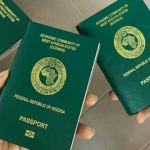Nigeria has taken a bold step toward modernising its travel document system with the launch of a centralised passport personalisation hub that can produce up to 5,000 passports daily. The facility, located at the Nigeria Immigration Service (NIS) headquarters in Abuja, represents the most significant reform in passport processing since the establishment of the service 62 years ago.
For years, Nigerians at home and abroad have struggled with long delays, backlogs, and inefficiencies in obtaining passports. The new system marks a sharp departure from the old structure where multiple centres across the country had a combined daily production capacity of just 250 to 300 passports. By consolidating operations into one hub, officials say the country can now process applications faster, more securely, and to global standards.
During an inspection of the new facility, the Minister of Interior described the initiative as a game changer for Nigeria’s identity management system. He explained that the hub, built in partnership with IRISMAT Technologies Limited, deploys advanced machines capable of producing 1,000 passports every hour, allowing the NIS to clear daily demands within four to five hours of operation.
The Minister added that the reform would slash processing times, bringing Nigeria closer to its ambitious goal of one-week passport delivery. “When this administration came on board, we inherited over 204,000 pending applications. That backlog is now history. Everything is automated and efficient, ensuring Nigerians get value for their money,” he said.
Beyond efficiency, the centralised hub is expected to improve the integrity of Nigerian passports, enhancing uniformity and aligning with international standards for secure travel documents. This move is not just about technology but also about rebuilding public confidence. As the Minister put it, “This is more than just about documents; it’s about restoring trust and showing Nigerians that their government can deliver effectively.”
The reform is consistent with President Bola Tinubu’s broader agenda to modernise public institutions and strengthen service delivery. For Nigerians in the diaspora, the initiative could ease years of frustration caused by delays in renewing or obtaining passports, improving mobility and access to global opportunities.
Nigeria’s shift to a centralized passport system also mirrors reforms seen across Africa, where countries are increasingly embracing automation and digitalization to enhance service delivery. From Kenya’s e-passport rollout to Ghana’s biometric upgrades, the continent is steadily moving toward modern identity systems that support security, efficiency, and international recognition.
With the launch of this facility, Nigeria joins this continental trend, positioning itself as a leader in leveraging technology to meet rising demand for travel documents while ensuring that citizens receive faster and more reliable services.










